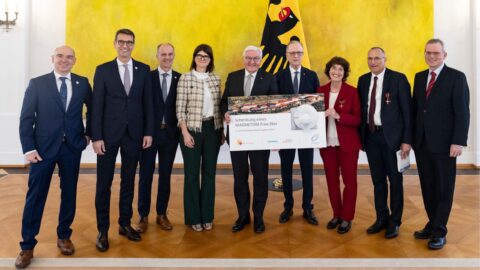Prize money donated for better health care in Peru

The three winners of the German Future Prize 2023 had decided to donate their prize money. The 250,000 euros went towards the purchase of a model of the Magnetom Free.Star scanner they developed. They also received additional financial support for the purchase of the MRI system: Siemens Healthineers AG, Siemens AG and Siemens Caring Hands each contributed a higher sum. The MRI system will be installed next year in the non-profit hospital “Diospi Suyana” in Apurímac in southern Peru to improve local health care.
Together with the other two award winners – Dr. Stephan Biber and Dr. David Grodzki from Siemens Healthineers – Prof. Uder symbolically handed over the MRI system to Dr. Klaus-Dieter John and Dr. Marina John, the two founders of Diospi Suyana, on November 27, 2024 at Bellevue Palace in Berlin in the presence of Federal President Frank-Walter Steinmeier and Augusto Arzubiaga Scheuch, Ambassador of the Republic of Peru in Germany and Olaf Böttger, the chairman of the Diospi Suyana e. V.

Diospi Suyana specializes in the care of the indigenous Quechua people. Patients from all over the country visit the hospital – but a magnetic resonance tomograph for the precise diagnosis of a wide variety of diseases has not existed until now. The donation includes a service contract for ten years. In addition, Prof. Uder and his team from the University Hospital Erlangen will support the doctors in Peru for several weeks in integrating the new device into the clinical processes on site. The Magnetom Free platform was developed with the goal of bringing imaging technology to places where it was not possible before – such as in the Andean region of Apurímac. The devices are equipped with a variety of innovations that enable easy installation, maintenance and handling while maintaining high image quality.
The Magnetom Free platform is the result of more than ten years of development work by Stephan Biber, David Grodzki and their teams at Siemens Healthineers. MRI has been fundamentally rethought in order to break down barriers around the technology. Be it because there is a lack of financial resources for a necessary building conversion, no liquid helium is available for magnetic cooling, or because no trained personnel are available for the complex investigations. Magnetom-Free systems have a lower field strength of 0.55 Tesla, combined with AI-based image reconstruction for high diagnostic quality for standard examinations, as well as simplified infrastructure requirements due to a drastically reduced helium requirement of 0.7 liters. Michael Uder and his institute were responsible for the clinical trial and the integration of Magnetom Free into clinical routine.